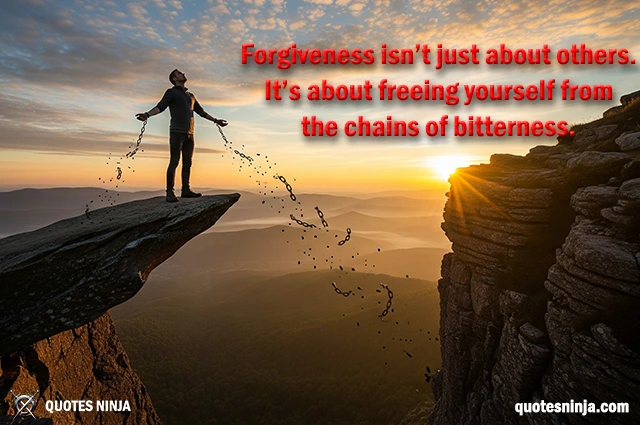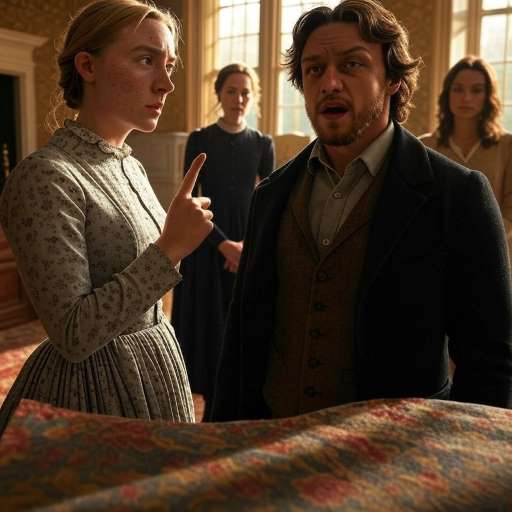
Deeper Meaning of Forgiveness Quote
Forgiveness Quote: “Forgiveness isn’t just about others. It’s about freeing yourself from the chains of bitterness.”
The quote, emphasizes that forgiveness is as much for your own well-being as it is for the person you’re forgiving.
Here’s a breakdown of its meaning:
- “Forgiveness isn’t just about others…”
Most people think of forgiveness as something you do for someone else — like offering them a second chance or showing mercy. But this line points out that’s only part of the picture. The act of forgiving isn’t solely for the benefit of the person who wronged you.
- “…It’s about freeing yourself…”
When you hold onto resentment, anger, or hurt, you carry a burden. It can affect your mood, your health, and even your relationships with other people. Forgiving someone doesn’t necessarily mean forgetting what happened or saying it was okay — it means you’re choosing to let go of the negative emotional weight tied to that experience.
- “…from the chains of bitterness.”
Bitterness is like a prison — it keeps you emotionally stuck in the past, replaying the hurt, feeding anger, and often harming you more than the person who caused the pain. Forgiveness “frees” you from that prison. It breaks the “chains” that keep you tied to that pain, allowing you to move forward with more peace and clarity.
In short:
Forgiveness is a healing act for yourself. By letting go of bitterness, you give yourself emotional freedom and the chance to move forward without being defined by past wounds.
A story inspired by Forgiveness Quote “Forgiveness isn’t just about others. It’s about freeing yourself from the chains of bitterness.”
Forgiveness Story: “Forgiveness: A Journey Beyond Bitterness“
Briony Tallis lived with a secret that weighed heavily on her heart. That secret wasn’t just a memory—it was a chain that bound her in bitterness, remorse, and regret.

Young Briony Accusing Robbie:
In her youth, Briony acted out of naivety and a desperate desire for control. The day she accused Robbie, a mixture of misunderstanding and childish fear clouded her judgment. At that moment, she believed she was doing what was right. However, her false testimony condemned Robbie to prison and fractured the love between him and Cecilia. The ripple effects devastated many lives, but most of all, Briony’s own.
Initially, she did not face the full weight of what she had done. Instead, she buried her guilt beneath layers of denial and self-justification. As years passed, the bitterness inside her grew like a hidden poison. She avoided the truth, fearing that acknowledging it would destroy her. She built emotional walls to protect herself from the pain she had caused, but these walls also isolated her from healing and hope.
However, life has a way of forcing us to confront the darkest parts of ourselves. Briony’s bitterness became unbearable. She found herself haunted not just by memories, but by the recognition that her anger and guilt had trapped her in a prison of her own making. At last, she realized that forgiveness was not just a gift she owed to others—it was something she needed desperately for herself.

Briony Writing Alone in a Dimly Lit Room:
In time, Briony embraced writing as her way to seek atonement. Through her novels, she tried to rewrite the narrative and make peace with the past. Writing allowed her to speak the truth she had long suppressed and to honor the love and pain she had witnessed. Yet, she understood that no story could fully undo the damage, nor erase the past. Instead, writing became a tool for self-forgiveness, a step toward releasing the bitterness that held her captive.
Moreover, Briony’s reflections revealed a deeper understanding of forgiveness. Forgiving did not mean forgetting or excusing what had happened. It did not require erasing pain or pretending the past never existed. Rather, forgiveness meant choosing to let go of resentment and anger that only prolonged suffering. It meant acknowledging the complexity of human mistakes and granting compassion—to others and to herself.
Bitterness, Briony realized, was like clutching sharp stones in her hands. The tighter she gripped them, the more they hurt her. If she could open her hands and let go, she might find relief from the wounds she carried. Forgiveness, then, was an act of liberation—a deliberate choice to break free from the chains of bitterness.

Broken Love: Cecilia and Robbie Apart:
As Briony aged, her longing for Cecilia and Robbie grew deeper. She wanted to honor their love, the love that had been cruelly torn apart by her false accusation. In her later years, Briony penned the story she wished had been possible—a story where love could have triumphed over misunderstanding and pain. Although she could not change the past, she hoped her words might bring some peace to the lives that had been shattered.

Briony Opening Her Hands, Releasing Chains:
But in time, Briony came to understand that forgiveness wasn’t about erasing the past—it was about letting go. She realized that bitterness was like clutching sharp stones. Only by opening her hands—by releasing the chains of anger and guilt—could she begin to heal. Forgiveness, she discovered, was not just a gift to others, but a form of liberation for herself.

Briony’s Peaceful Reflection:
In her final years, Briony found peace—not because she changed the past, but because she had the courage to face it. Sitting by the window, gazing out at the world with quiet reflection, she embraced the grace that forgiveness brought. Her journey taught her that true healing begins when we choose compassion over punishment, and truth over silence.
Moral of the story:
Briony Tallis’s journey shows us that forgiveness is not simply about granting mercy to others; it is fundamentally about liberating ourselves. She discovered that holding onto bitterness only prolongs pain and imprisonment within our own hearts. By choosing to forgive—both others and herself—Briony unlocked the chains that had bound her for decades, allowing her to find peace amid the ruins of her past. As the saying goes, “Forgiveness isn’t just about others. It’s about freeing yourself from the chains of bitterness.” Through this realization, Briony’s story reminds us that forgiveness is not weakness but an act of courage and grace that heals the soul and restores freedom.
To explore more on stories and dive into related ideas, be sure to check out the other posts where we cover all sort of stories related to quotes. Stay tuned for more…..
To explore more on quote topics, be sure to check out the other topics where we cover all categories of quotes. Stay tuned for more…..

